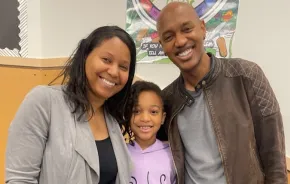 The argument erupts in every generation: Should children be made to read quality literature, or should they be allowed to follow their own interests, even if that means Goosebumps and comic books?
The argument erupts in every generation: Should children be made to read quality literature, or should they be allowed to follow their own interests, even if that means Goosebumps and comic books?Parents are often caught in the middle of reading tug-of-wars. In an essay last fall in The New Yorker titled “The Percy Jackson Problem,” Rebecca Mead worried about a generation of kids who only read Rick Riordan while admitting that she enjoyed Enid Blyton during her own childhood. I can relate. My fifth-grader has craved high fantasy like it is Turkish delight in The Lion, the Witch and the Wardrobe since discovering Riordan’s books three years ago. Should I be worried?
Choose your own conclusion
Author Neil Gaiman asserts that reading of any kind is valuable because it ignites a love for words and information. In his talk for the nonprofit Reading Agency, Gaiman says, “The simplest way to make sure that we raise literate children is to teach them to read, and to show them that reading is a pleasurable activity. And that means, at its simplest, finding books that they enjoy, giving them access to those books and letting them read them.”
On the other hand, author and literature professor Tim Parks argued last year in The New York Review of Books that the pleasures of genre fiction are distinct from those of more challenging literature, so there is no motivation to move from one to the other. In other words, Sweet Valley High is not a gateway to Jane Austen.
 Educational research on the development of reading skills is reassuring. “A study that I found most compelling related to this question looked at first-graders’ exposure to print. They found that children’s knowledge of books at the first-grade level contributed uniquely to their reading comprehension and general knowledge 10 years later,” says Deborah McCutchen, professor and interim dean of the College of Education at the University of Washington.
Educational research on the development of reading skills is reassuring. “A study that I found most compelling related to this question looked at first-graders’ exposure to print. They found that children’s knowledge of books at the first-grade level contributed uniquely to their reading comprehension and general knowledge 10 years later,” says Deborah McCutchen, professor and interim dean of the College of Education at the University of Washington.
Think of this in relation to the Matthew effect — a theory of accumulated advantage (you’ve heard it as “The rich get richer, and the poor get poorer”): The more books that there are in a child’s early life, the more books there will be in their later life. It does not matter what books first-graders are familiar with or whether they can read the books themselves. What is important is simply the number of books they are exposed to.
“It’s not a big assumption that any book will use vocabulary that is outside of a child’s daily experience,” explains McCutchen. For example, Riordan’s books use words such as “trident” and “sarcophagus.” The Incredible Hulk uses “gamma radiation.” Children with less exposure to print run into a higher proportion of unfamiliar words in assigned reading and struggle to make sense of them, which slows the learning process.
Comprehension is what counts
“Until third grade, children are learning to read; after third grade, they are reading to learn” is a familiar axiom in parent-teacher conferences. After third grade, what children read becomes more important, but not necessarily in the way you might expect.
“Connecting with the text keeps them reading and practicing skills. That’s the basis of reading comprehension. I have seen a lot of students increase their reading ability simply by reading books of interest,” says Genya Devoe, chair of the Reading Endorsement Program at Antioch University Midwest.
“Meet the student where he or she is,” McCutchen advises. Some students may require a simpler version of the text, or a different format. “Read books aloud that are at a higher level than what kids can read themselves, but also explain the readings with explicit vocabulary instruction,” Devoe suggests. The important factor is engagement with extended text.
 “It is increasingly important to get kids reading nonnarrative, informative texts,” McCutchen says. Books with a hierarchical information structure develop important study skills that narratives don’t, such as reading graphs and using an index. According to Devoe, even comic books are beneficial because they connect to the skills used to find information online. They also often hold more interest for students who struggle with traditional texts.
“It is increasingly important to get kids reading nonnarrative, informative texts,” McCutchen says. Books with a hierarchical information structure develop important study skills that narratives don’t, such as reading graphs and using an index. According to Devoe, even comic books are beneficial because they connect to the skills used to find information online. They also often hold more interest for students who struggle with traditional texts.
Once kids find a series they love, they do tend to continue in that genre. Teachers and parents should provide opportunities and guidance to branch out from exactly where students are. They need something to scaffold on, so encourage them by helping them select different books that connect to their interests,” Devoe says. Riordan fans might appreciate a collection of Greek myths or nonfiction about ancient Greece. A young Winnie the Pooh fan may enjoy a book about bears.
But what about quality? Is it enough for children to read a lot, even if they never read James Joyce?
“Gaining a sophisticated competency in literacy, I think, can be divorced from the issue of taste,” McCutchen says. “We forget that the ‘good books’ change dramatically over time. Is it better to read James Joyce or Shakespeare? Whose canon is the right one? I like a good murder mystery when I get on an airplane.”











